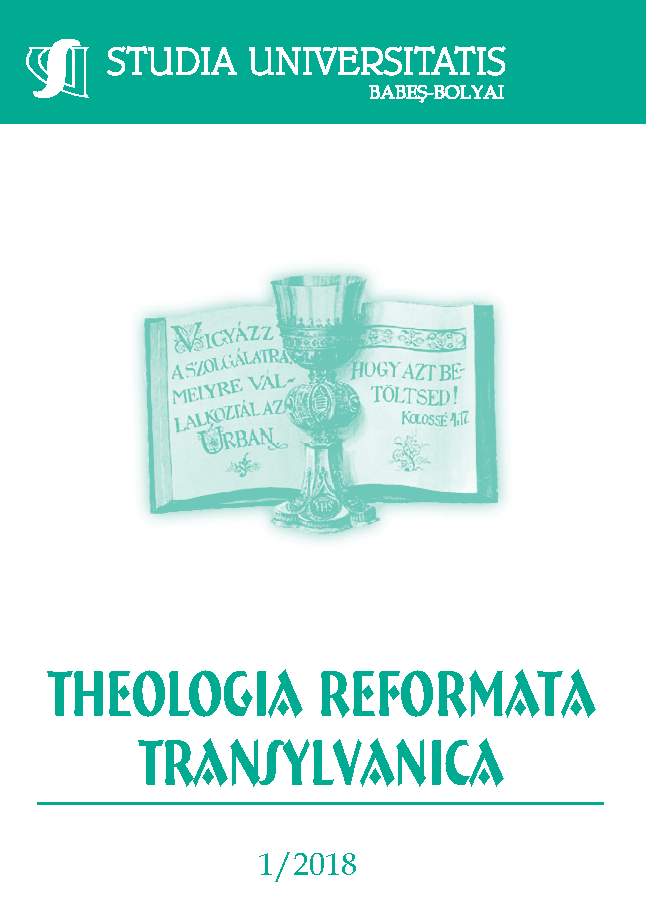Familienrekonstruktion – eine Methode der systemischen Seelsorge und der Seelsorgeausbildung
DOI:
https://doi.org/10.24193/subbtref.63.1.11Keywords:
family reconstruction, systemic pastoral care, pastoral education, family roots, family mystery, repatriate families.Abstract
Family Reconstruction – a Method of Systemic Pastoral Care and Pastoral Education.
Family therapy used reconstruction method intentionally first as a methodologically independent group procedure in the training of therapists, but later this approach entered into therapeutic practice. While the aim of the reconstruction work could be multiple the relevance of the method for pastoral care lies in the possibility, that not only a “personality-specific credo” but also a “family-specific credo” can be observed (K. Winkler). In search of repeated patterns and a “family-specific credo,” this article presents some methods of reconstruction work specifically for pastors or pastoral workers: genogram provides an overview of the multigenerational structure and recurring patterns of a family; “timeline” helps to capture and understand family events and significant facts in the lives of individual family members in synopsis; “family sculpture” offers the opportunity to present key events in the family history in such a way that they are not primarily tied to linguistic expressive possibilities. As a result, until then “fixed” interpretations and evaluations of the individual or shared experiences can change qualitatively. Another result can be the deconstruction of family secrets. Because certain topics are subject to a generational taboo and are often associated with strong guilt and anxiety, they must not be talked about, though, mostly, everyone knows about it. When secrets become disk-functional, they can be crippling for family interactions. In the article below we present some useful questions of the so-called circular approach to help professionals understand the function of the family mystery. Another tool used in family reconstruction is the reinterpretation of old stories. There are always several possible views of certain events. During a family reconstruction interpretations of certain events that causes blockages and withholds people from reconciliation or keep them in painful experiences, a discovery of new interpretation is possible. The experience remains, but the individual interpretation is changed. In those following, the article presents three examples of the application of family reconstruction in pastoral care and pastoral education. First the possibilities of training and advanced training in special pastoral care is presented. One of the core questions lie in the choice of the individual for the special field. For education and training is indispensable that the family roots of such job choices be identified. Secondly a job-related application of family reconstruction comes detailed. Third a reconstruction approach in intercultural and therapeutic pastoral care is presented. Repatriate families often experience an identity crisis in their new environment that can be so severe that they require psychiatric treatment. In such cases, there are good experience in therapeutic pastoral care with a longer family reconstruction.
References
Baldwin, M; Satir, V: Familientherapie in Aktion. Die Konzepte von VirginiaSatir in Theorie und Praxis. Junfermann, Paderborn 1988.
Hézser, G: Familienrekonstruktion. Eine Methode der systemischen Seelsorge und der Seelsorgeausbildung. In: Schneider-Harprecht, Christoph: Zukunftsperspektiven für Seelsorge und Beratung, Neukirchener Verlag, Neukirchen Vluyn 2000, 167–173.
Hézser, G: Seelsorge mit Angehörigen und Mitbetroffenen. In: Klessmann, Michael (Hg.), Handbuch der Krankenhausseelsorge, Göttingen 1996, 161–170.
Hézser, G: Wenn die Verbundenheit entzweit. interkulturelle Familienseelsorge in der Psychiatrie. In: Wege zum Menschen 47 (1995), 417–421.
Jakab, S: Beziehungen erleben: Aspekte menschlicher Beziehungen aus der Sicht heilender systemischer Poimenik für Gemeindeseelsorge, Spezialseelsorge und Diakonie. LIT Verlag, Münster, 2006.
Kaufmann, R. A.: Die Familienrekonstruktion. Ansager, Heidelberg, 1990.
McGoldrick, Gerson M.: Genograms in Family Assessment. Norton, New York 1985. Deutsch: Genogramme in der Familienberatung. Hans Huber, Bern, 1995.
Morgenthaler, C: Systemische Seelsorge. Impulse der Familien- und Systemtherapie für die kirchliche Praxis. Kohlhammer, Stgt./Bln./Köln, 1999.
Nervin, W. F.: Familienrekonstruktion in Aktion. Junfermann, Paderborn, 1989.
Satir, V., Baldwin, M.: Familientherapie in Aktion. Junfermann, Paderborn, 1988.
Schlippe, von, A.; Schweitzer, Jochen; Stierlin, Helm: Lehrbuch der systemischen Therapie und Beratung. Vanderhoeck und Ruprecht, Göttingen, 1995.
Stierlin, H: Delegation und Familie: Beiträge zum Heidelberger familiendynamischen Konzept. Suhrkamp, Frankfurt, 1989.
Weiss, T: Familientherapie ohne Familie: Kurztherapie mit Einzelpatienten,.Kösel, München, 1988.
Weiterführende Literatur
Alexander, J.; Holtzworth-Munroe, A.; Jameson, P.: The process and outcome of marital and family therapy: research, review and evaluation. Springer, Berlin–Heidelberg–New York–Tokio 1994. 25–31.
Baer, U., Frick-Baer, G.: Wie Traumata in die nächste Generation wirken. Untersuchungen, Erfahrungen, therapeutische Hilfen. Neukirchen Vluyn, Affenkönig 2010.
Battke, K.: Trümmerkindheit. Erinnerungsarbeit und biografisches Schreiben für Kriegskinder und Kriegsenkel. Kösel, München, 2013.
Bauer, J.: Das kooperative Gen. Abschied vom Darwinismus. Hoffmann und Campe, Hamburg, 2008.
Bauer, J.: Selbststeuerung: Die Wiederentdeckung des freien Willens, Blessing, München, 2015.
Bosch M.; Ullrich W. (Hg): Die entwicklungsorientierte Familientherapie nach Virginia Satir. Junfermann, Paderborn, 1989.
Conen, M. L.: Systemische Familienrekonstruktion. In: Systemische Therapie 11 (2) (1993) 84–95.
Conen, M.-L.: Systemische Familienrekonstruktion. In: Zeitschrift für Systemische Therapie 11 (1993) 2, 84–95.
Holl, W.: Psychodramatische Familienrekonstruktion mit Handpuppen. In: Jugendwohl 75 (1994). 256–262.
Richardson, R. W.: Family Ties that Bind. Self Councel Press, Bellingham, 1987.
Tschanz Cooke, K.: Hoffnungsorientierte systemische Seelsorge. Die Familientherapie
Virginia Satirs in der Seelsorgepraxis. Kohlhammer, Stuttgart, 2013.
Downloads
Published
How to Cite
Issue
Section
License
Copyright (c) 2018 Studia Universitatis Babeș-Bolyai Theologia Reformata Transylvanica

This work is licensed under a Creative Commons Attribution-NonCommercial-NoDerivatives 4.0 International License.






